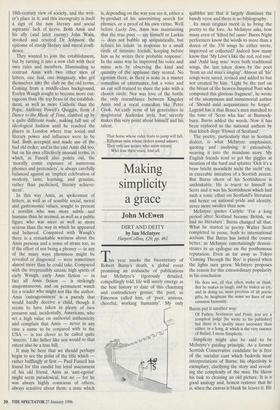Making simplicity a grace
John McEwen
DIRT AND DEITY by Ian McIntyre HarperCollins, £20, pp. 461 This year marks the bicentenary of Robert Bums's death, a global event promising an avalanche of publications but McIntyre's rigorously detailed, compellingly told, life will surely emerge as the best history to date of this charming and contradictory genius; the poet, as Emerson called him, of 'poor, anxious, cheerful, working humanity'. My only quibbles are that it largely dismisses the bawdy verse and there is no bibliography.
Its most original merit is to bring the poetry to the fore. As McIntyre asks, how many even of 'kilted bel canto' Burns Night performers know the words to more than a dozen of the 370 songs he either wrote, improved or collected? Indeed how many know that 'My Love's like the red, red rose' and 'Auld lang syne' were both traditional songs, the last taken down by the poet `from an old man's singing'. Almost all 'his' songs were saved, revised and added to but not created by him. 'Light be the turf on the breast of the heaven-Inspired Poet who composed this glorious fragment', he wrote of the anonymous and immemorial author of 'Should auld acquaintance be forgot'. Legend has it that Bruce's men marched to the tune of 'Scots wha hae' at Bannock- burn. Burns added the words. Now it has been replaced as the national anthem by that kitsch dirge 'Flower of Scotland'.
The poetry, particularly that in Scottish dialect, is what McIntyre emphasises, quoting and analysing it extensively, weaving it into the mundane story. My English friends tend to get the giggles at mention of the bard and splutter `Och it's a braw bricht moonlicht nicht the nicht' etc, in execrable imitation of a Scottish accent. But Burns shorn of his Scottishness is unthinkable. He is truest to himself in Scots and it was his Scottishness which had such a tonic effect on Scotland's literature and hence on national pride and identity, never more swollen than now.
McIntyre quotes Carlyle: 'For a long period after Scotland became British, we had no literature'. Burns changed all that. What he started in poetry Walter Scott completed in prose, both to international acclaim. But Burns has lasted the course better, as McIntyre entertainingly demon- strates in an epilogue on the posthumous reputation. Even as far away as Tokyo `Coming Through the Rye' is played when the lights turn green. McIntyre proposes the reason for this extraordinary popularity in his conclusion:
He does not, all that often, make us think. But he makes us laugh, and he makes us cry, and in doing so, most precious of all poetic gifts, he heightens the sense we have of our common humanity.
Burns put it another way:
Of Pathos, Sentiment and Point, you are a compleat judge [he wrote to his publisher] but there is a quality more necessary than either, in a Song, & which is the very essence of Ballad, I mean Simplicity.
Simplicity might also be said to be McIntyre's guiding principle. As a former Scottish Conservative candidate he is free of the socialist cant which bedevils most interpretations of Burns; his objectivity is exemplary, clarifying the story and reveal- ing the complexity of the man. He likens his task to cleaning an old picture. It is a good analogy and, honest restorer that he is, when the canvas is blank he leaves it. He relies only on Burns's words or those who knew him. As a result there are gaps and hazy periods, particularly in Burns's most creative years. Nevertheless the picture that emerges is clear enough. Burns was poor but not a peasant, if that implies uneducated. Both he and his brother shone at school and readers will be gratified to learn that his 'knowledge of modern man- ners, and of literature and criticism I got from The Spectator'. By the age of 27, before he had left his Ayrshire home, he had written all his major poems except his one attempt at narrative, 'Tam o' Shanter'. Only one, and a masterpiece! 'More's the pity', writes McIntyre, who reckons that on the strength of this and his letters he could also have been Scotland's greatest novelist and travel writer.
This first period culminates with the pub- lication of the famous Kilmarnock edition of his Poems, Chiefly in the Scottish Dialect. Encouraged by its reception he sought his fortune in Edinburgh and was an overnight sensation. All doors were opened and his acceptance by the Establishment proved lastingly rewarding and helpful. The Kilmarnock edition was extended and reissued as the Edinburgh edition, from which he made a profit of about £120,000 in today's money. During his stay one of the immortal literary meetings took place, between him and the teenage Walter Scott. Scott did not forget: I never saw such another eye in a human
head, though I have seen the most distin- guished men of my time.
In Edinburgh he met an engraver and music-seller who was collecting Scots songs to publish them in arrangements for the pianoforte. Burns agreed to collaborate and until his death at 37 his creative energy was concentrated on this 'hobby', as he called it. It required research and in 1787 he explored much of Scotland, picking up songs and exploiting his fame by calling on the nobility. Subsequently he retired to Ayrshire, married his long-suffering mistress Jean Armour, a simple local woman and, having failed as a farmer, took advantage of his contacts to be appointed an exciseman in Dumfries. It was hard work, which he did diligently, but it offered status, job-security, variety and travel.
McIntyre's account is especially revealing of the difficulties incumbent on Bums as `Scotland's first class-conscious poet'. Burns did not take easily to fame, predict- ing its consequence with alarming clarity in an early poem, `To a Mountain Daisy':
Such is the fate of simple bard On life's rough ocean luckless starr'd! Unskilful he to note the card Of prudent lore, Till billows rage and gales blow hard And whelm him o'er!
He was simultaneously angered by the fawning of those he had known and the condescending attentions of the Establish- ment. It brought out the artistic anarchist in him and made him socially unreliable, a contradiction of Jacobin and Jacobite which, to his distress, sometimes put his job in jeopardy. Some of his truest friends, notably Mrs Dunlop and Lord Glencairn, were upper-class, but he preferred the simple life — though never so simple that he could resist the complication of 'hough- magandie', resulting in several illegitimate children and much Kirk displeasure. Although he was a solicitous husband and father, romance, as he admitted, was essen- tial to his muse. He drank too much, shied away from cashing in on his success and may have died of brucellosis. As a freeman of Dumfries, an officer in the local militia and a member of the Royal Company of Archers, the sovereign's ceremonial bodyguard in Scotland, he was buried with full military honours. The future Prime Minister Lord Liverpool, then young Jenkinson MP, was among the principal mourners.
One reference McIntyre might have included is the 20th-century dissent of Lampedusa, author of The Leopard:
He is in fact the typical 'faux bonhomme' type of writer who makes an affectation of extreme simplicity, who says he finds the English language too difficult and therefore takes refuge in the Scottish dialect.
This book makes short shrift of such nonsense.



























































 Previous page
Previous page